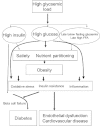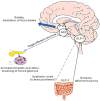Impact of postprandial glycaemia on health and prevention of disease
- PMID: 22780564
- PMCID: PMC3494382
- DOI: 10.1111/j.1467-789X.2012.01011.x
Impact of postprandial glycaemia on health and prevention of disease
Abstract
Postprandial glucose, together with related hyperinsulinemia and lipidaemia, has been implicated in the development of chronic metabolic diseases like obesity, type 2 diabetes mellitus (T2DM) and cardiovascular disease (CVD). In this review, available evidence is discussed on postprandial glucose in relation to body weight control, the development of oxidative stress, T2DM, and CVD and in maintaining optimal exercise and cognitive performance. There is mechanistic evidence linking postprandial glycaemia or glycaemic variability to the development of these conditions or in the impairment in cognitive and exercise performance. Nevertheless, postprandial glycaemia is interrelated with many other (risk) factors as well as to fasting glucose. In many studies, meal-related glycaemic response is not sufficiently characterized, or the methodology with respect to the description of food or meal composition, or the duration of the measurement of postprandial glycaemia is limited. It is evident that more randomized controlled dietary intervention trials using effective low vs. high glucose response diets are necessary in order to draw more definite conclusions on the role of postprandial glycaemia in relation to health and disease. Also of importance is the evaluation of the potential role of the time course of postprandial glycaemia.
© 2012 ILSI Europe. obesity reviews © 2012 International Association for the Study of Obesity.
Figures


References
-
- Pi-Sunyer FX. The obesity epidemic: pathophysiology and consequences of obesity. Obes Res. 2002;10(Suppl. 2):97S–104S. - PubMed
-
- Li Z, Bowerman S, Heber D. Health ramifications of the obesity epidemic. Surg Clin North Am. 2005;85:681–701. - PubMed
-
- Chiasson JL, Josse RG, Gomis R, Hanefeld M, Karasik A, Laakso M. Acarbose treatment and the risk of cardiovascular disease and hypertension in patients with impaired glucose tolerance: the STOP-NIDDM trial. JAMA. 2003;290:486–494. - PubMed
-
- Califf RM, Boolell M, Haffner SM, et al. Prevention of diabetes and cardiovascular disease in patients with impaired glucose tolerance: rationale and design of the Nateglinide and Valsartan in Impaired Glucose Tolerance Outcomes Research (NAVIGATOR) Trial. Am Heart J. 2008;156:623–632. - PubMed
-
- Roumen C, Corpeleijn E, Feskens EJ, Mensink M, Saris WH, Blaak EE. Impact of 3-year lifestyle intervention on postprandial glucose metabolism: the SLIM study. Diabet Med. 2008;25:597–605. - PubMed
Publication types
MeSH terms
Substances
LinkOut - more resources
Full Text Sources
Other Literature Sources
Medical

